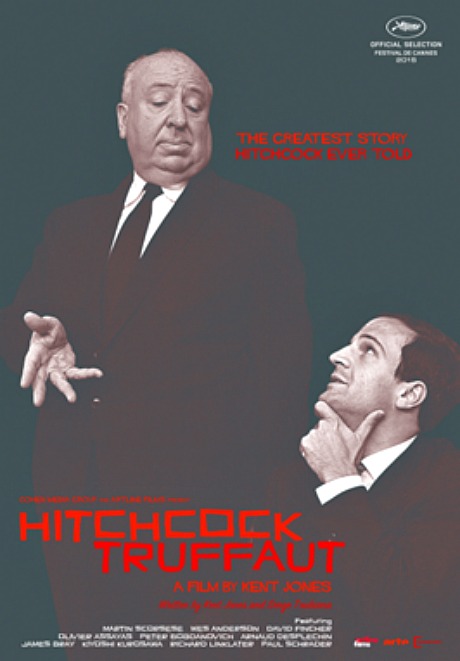Yesterday morning in Paris I attended a screening of Kent Jones‘ edifying Hitchcock/Truffaut, which Jones directed and co-wrote with Cinematheque Francaise director Serge Toubiana. Slated to show on 5.19 at the Cannes Film Festivals, the 80-something-minute doc is a sublime turn-on — a deft educational primer about the work and life of Alfred Hitchcock and, not equally but appreciably, Francois Truffaut. Efficient, well-ordered, devotional.

No, it didn’t tell me anything about Hitchcock or his many films or Truffaut’s renowned “Hitchcock/Truffaut” book (a feature-length q & a interspersed with frame captures from Hitch’s films) that I didn’t already know, but that’s okay — almost every detail of the book’s material was absorbed into my system decades ago.
The bounce, if you will, comes from the talking heads — David Fincher, Martin Scorsese, Olivier Assayas, Wes Anderson, Richard Linklater, James Gray, Arnaud Depleschin, one or two others — each enthused and semi-aglow in their own way. Memories, associations, gratitude.
To me Hitchcock/Truffaut seems good and wise enough to seduce the novice as well as the sophisticated cineaste. It’s a fully absorbing, excellent education. As you might expect, it made me want to read the book all over again.
It contains many snippets of interview audio between the two men. My favorite Hitch quotes: (a) “Logic is dull” and (b) “Plausibility was not allowed to rear its ugly head.”
I sat up in my seat when Jones revealed a brief glance at contact sheet images of Hitch shooting the Phoenix hotel room scene (Janet Leigh, John Gavin) in Psycho — images I’d never seen before. I asked Jones if I could somehow post a few of them but he wasn’t encouraging. Apparently they’re under some kind of copyright lock and key. Which of course is nonsensical at this stage.
The doc doesn’t mention why it took Truffaut nearly four years to get the book to print. The sit-down sessions were done in the fall of ’62 when Hitch was in post-production on The Birds. The book popped in Europe in late ’66 and in the U.S. the following year. Truffaut got Hitch to sit down again some time late in this cycle (early ’66?) to discuss Marnie and Torn Curtain.
Boilerplate: “In the fall of 1962, whilst Hitchcock was in post-production, François Truffaut carried out extensive interviews with Hitchcock at his office at Universal Studios. The interviews were recorded to audio tape and the content eventually edited down into Truffaut’s Hitchcock book.
“Although Truffaut could speak a little English, he hired Helen Scott (of the French Film Office in New York) to act as the translator for the interviews.
“In 1984, Patricia Hitchcock donated a set of the interview tapes to the Margaret Herrick Library, where they are now part of the Hitchcock Collection. Although Truffaut claimed that the recordings lasted 50 hours, the surviving tapes — which cover the 1962 interviews — last for less than 26 hours.
“Truffaut had intended to quickly publish the book of the interviews, but the first edition wasn’t published until several years later (1966 in France, 1967 in America). To bring the book up-to-date, Truffaut conducted further interviews to discuss Marnie and Torn Curtain.”
Truffaut’s introductory letter to Hitchcock: “If, overnight, the cinema had to do without its soundtrack and become once again a silent art, then many directors would be forced into unemployment, but among the survivors there would be Alfred Hitchcock, and everyone would realize at last that he is the greatest film director in the world.”
“Dear Mr. Truffaut,” replied Hitchcock. “Your letter brought tears to my eyes. And how grateful I am to receive such a tribute from you.” — Excerpt from Kent Jones essay about Truffaut, contained in the Criterion Bluray of The Soft Skin, a Truffaut film I’ve never much cared for.
The background of the Notorious kissing scene, or more precisely, as Hitchcock described, “a little matter of the physical aspect” of it, is re-explored in the doc. “The actors, of course, hated doing it,” Hitch recalls. “They felt dreadfully uncomfortable in the manner of how they had to cling to each other. And I said to them, I don’t care how you feel. I only know how it’s going to look on the screen.”









